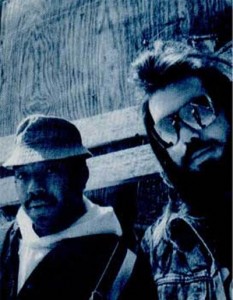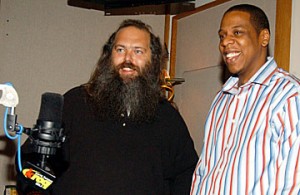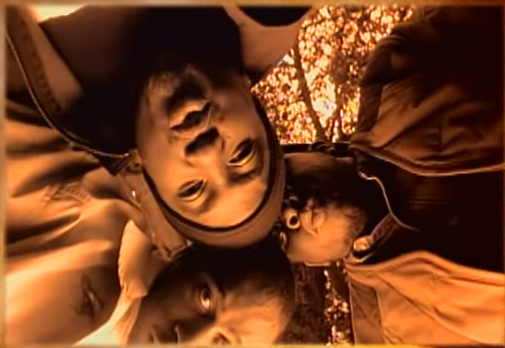If Rick Rubin had left a trail of bread crumbs back in 1982 when he founded Def Jam Recordings, it would be almost impossible for anyone in 2009 to trace them back to his roots. Even if you had a complimentary map, the path would be too forked and massively divergent for you to return and that’s not a bad thing. Mr. Rubin has managed in the last 27 years to sprinkle his genius into almost every genre imaginable while not having a recurring sound in tow. His thought pattern is simple; melodies are organic and grow through time, trial and error and they are not cookie-cutter concoctions with corporate deadlines or producer contrived signatures.
This creative, almost anti-business look at making music has made Rubin one of the most influential music men of our time. However, his stance on the production of an album is the antithesis to how music business is handled these days. It’s a throwback to simpler times when artists functioned with a creative process devoid of red tape and business routine. He also understands that the business side short circuits the quality of music. It’s his refusal to conform that has made him the go to guy for artists new and old for over two decades.
His early Def Jam production was usually bare bones, crafting a sparse palette for the emcees words to shine through. Back then, Hip Hop had just taken the turn from DJ driven to emcee driven. Rubin’s stripped down qualities fit perfectly with the rising tide of emcee dominance and his eclecticism became obvious as well. His earliest work with LL Cool J (Radio) and the Beastie Boys (Licensed to Ill) laid out markedly different tracks based on the artist’s energy. Another element of Rubin’s work became obvious early too, his love for rock and roll.
Rubin was one of the first to fuse the genres of rap and rock and remains one of the few that can do it perfectly. The rock driven tracks created for the Beasties were obvious. They were a punk band turned Hip Hop group who were simply adding elements to a blossoming hybrid sound. What wasn’t obvious was the definitive in rock rap fusion, “Walk This Way.” Well, it was obvious to Rubin.
Rubin believed rock and rap shared the same sentiment. A raging against the machine united them in their power and that double up proved shocking, yet sonically cohesive, to fans of both genres when Run-DMC and Aerosmith released “Walk This Way” in 1986. With “Walk This Way,” a cover of the rock only version Aerosmith released 10 years earlier, Rubin created the rock/rap hybrid that resurrected the failing Aerosmith and introduced Run-DMC to a global audience. It also taught Rubin the power of the cross-over cover.
Rubin left Def Jam in the capable hands of co-founder Russell Simmons and then President Lyor Cohen after this release. It was at this point he started his 2nd label, Def American Recordings which he later re-named American Recordings after having a burial for the word “def”, and his desire to dismiss the lines between genres came to complete and sometimes wacky fruition. Rubin’s Dr Frankenstein approach to creating a song led the Red Hot Chili Peppers into covering the Ohio Players “Love Roller Coaster.” His push for the band to create more with less changed their hard rock sound into a more cross culturally palatable funk driven smorgasbord that ratcheted their popularity up dramatically and cemented Rubin as their primary producer.
Rick also moved onto country music, presenting “Hurt,” a song from industrial rock king Trent Reznor to Johnny Cash and suggesting he re-do it, but with his own unique style. The B-side of this single was a cover of Depeche Modes “Personal Jesus” by the way. Rubin’s out of the box song selections and Cash’s wonderfully stoic presentation catapulted Cash back into the spotlight. However, Cash died before the song was released.
The list of Rubin’s other projects are no less diverse. He crafted the hard edged rock track fo r Lil John’s “Stop Fuckin With Me,” the masterfully soulful “Another Song All Over Again” for Justin Timberlake, by far the best offering on his album Future Sex/Love Sounds and the achingly emotional “Not Ready to Make Nice” by country trio The Dixie Chicks that took home the Grammy for Record of the Year in 2007. There have also been collaborations with Saul Williams, Metallica, Donovan, Green Day, Shakira and the Geto Boys as well as countless others.
r Lil John’s “Stop Fuckin With Me,” the masterfully soulful “Another Song All Over Again” for Justin Timberlake, by far the best offering on his album Future Sex/Love Sounds and the achingly emotional “Not Ready to Make Nice” by country trio The Dixie Chicks that took home the Grammy for Record of the Year in 2007. There have also been collaborations with Saul Williams, Metallica, Donovan, Green Day, Shakira and the Geto Boys as well as countless others.
Rick Rubin is a one of a kind talent. There are a plethora of successful producers working today, but none with such an intimate understanding of how a song works. Rubin’s mystical persona has darted in and out of every genus of music we know with an uncanny knowledge of what works and what doesn’t. He said recently that he’s not looking for the new sound. He just hopes that musicians will take what they have and make it better. That’s what he does. He pulls the inner artist out of these performers and guides their path until they have become the best they can be. For that, he more than deserves his ranking as one of the best producers in the history of not just Hip Hop, but music period.
Follow shelz on Twitter @ http://twitter.com/shelzp
Follow Us on Twitter @ http://twitter.com/planetill
Join Us on the Planet Ill Facebook Group for more discussion
Check out Planet Ill’s page on Essence.com
Follow us on Networked Blogs






2 thoughts on “2009 Wrap-Up:Rick Rubin-Def Architect”